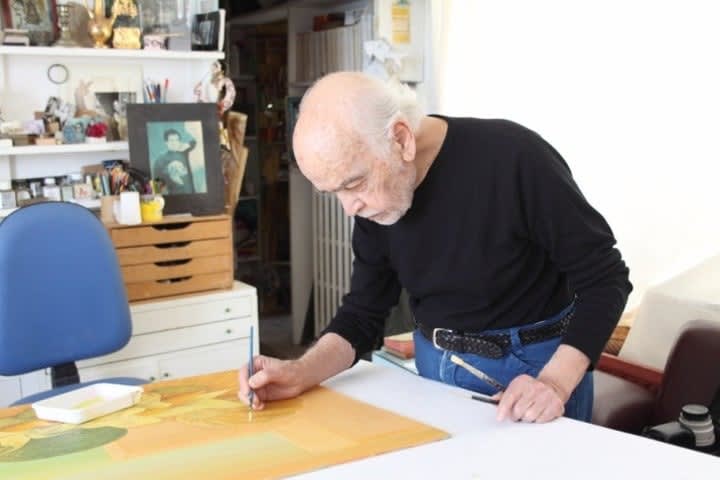"Within a flat surface plane, where tiled walls and the rolling mountains of Boukornine stand in the background, the artist depicts with mannerism faces and figures reminiscent of Egyptian goddesses, wielding spinning wheels, jasmine bouquets while intricately adorned in pattern."
Born in the picturesque Mediterranean town of Sidi Bou Saïd, Ben Abdallah studied in Tunis and is known as a ceramist, mosaicist, fresco painter, and sculptor. First exhibiting his paintings at the age of 16, his early illustrations also appeared in the first Tunisian feminist periodical Leïla in the 1930s. He participated in the Salon Tunisien in 1942 and 1945, and established an atelier in Montparnasse in Paris in 1952. Associated with the École de Tunis, he adapts miniature painting to create finely detailed representations of quotidian life, idyllic women, surrealist imagery, horses, marine creatures, and ethereal seascapes. From 1950 he also received state commissions to make decorative ceramic tile panels for civic buildings. Amid his illustrious art practice, Ben Abdallah had also been a resident stage designer at the Tunis Theater. Exhibiting in Tunis and abroad since 1939, his contribution to Tunisian art was celebrated by a solo exhibition in 2010 at the Galerie Atrium in Carthage entitled ‘Femmes, je vous aime!’
Within a flat surface plane, where tiled walls and the rolling mountains of Boukornine stand in the background, the artist depicts with mannerism faces and figures reminiscent of Egyptian goddesses, wielding spinning wheels, jasmine bouquets while intricately adorned in pattern. His hieratic women are often the occasion for him to render with minuteness the Tunisian traditional costume in all its nobility and originality, embracing the art of capturing the “Femme Assise”. His attention to the subjects’ surroundings is ever-present, Painting scenes embellished with sculptured wood and wrought iron, Making the domestic look and feel just as divine.
Amongst the items that are often found in the domestic space, Ben Abdallah is drawn to utensils and musical instruments, rendering them with grace through his fine lines and flawless color; Revealing the objects with much of the elegance as his “Femme Assis”. The striking similitude of form and substance throughout both the animate and the inanimate lend to the admiration that Ben Abdallah has for both practice and subject.
